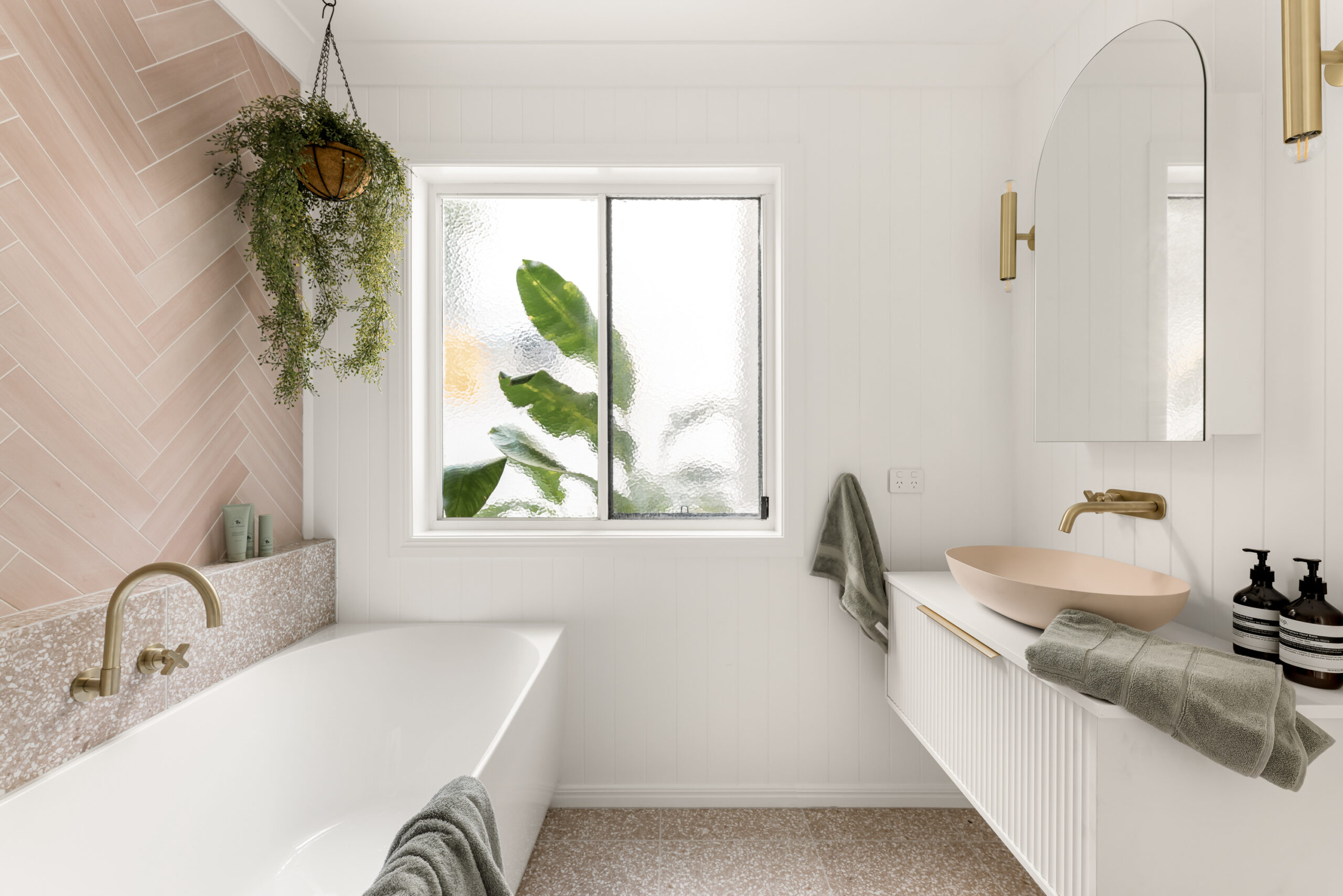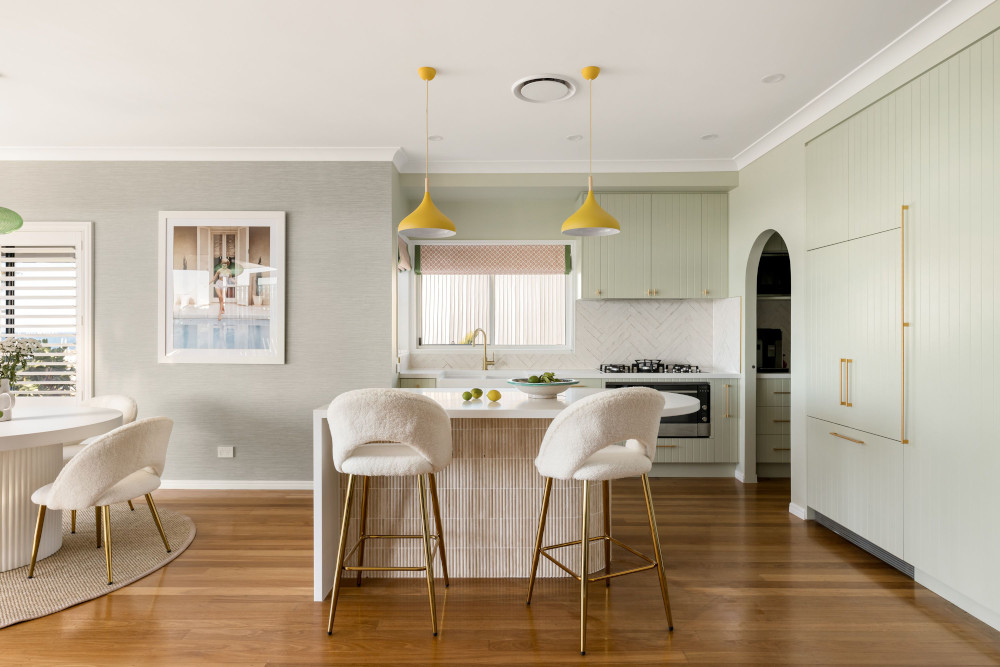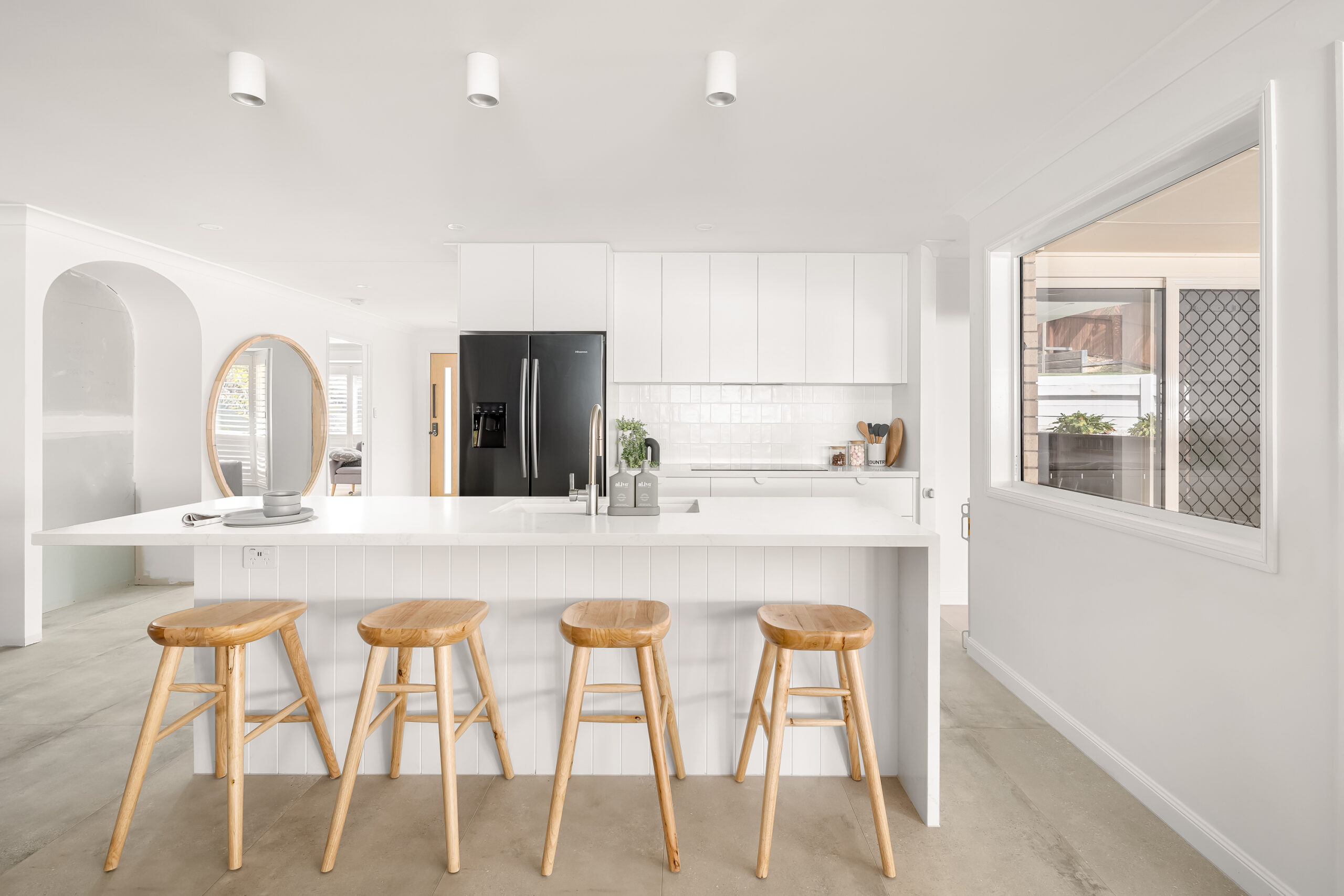If you have ever stepped foot inside a tile retailer, you’ll know how overwhelming choosing a tile (or three) can be. With our help – and this handy guide – choosing tiles for your bathroom will be easy and fun!
You will hear a lot of opinions on where to start when choosing bathroom tiles. Our advice? Start where you are. In other words, if you have already fallen in love with a gorgeous accent tile, start there, or if you are aiming to nail a particular bathroom design style, then start there. Maybe the size, layout, or budget of your bathroom renovation will be your starting point. It’s your project – we’re here to help you do it your way.
When choosing bathroom tiling, you will need to consider the tile material, size, shape, pattern and colour. Then factor in function, laying design and price.
Material
Ceramic tiles
Ceramic tiles are a great budget-friendly tile option. They are made from kiln-fired clay then finished with a durable glaze that makes them non-porous and stain resistant. The colour and pattern sits on the surface of a ceramic tile just below the glaze, this unfortunately means that chips and cracks can appear obvious should they occur.
There is a size, style and colour for almost every project and they are generally easy to lay, clean and maintain.
The ever-popular subway tile is a great example of a ceramic tile living its best life!
Porcelain tiles
Porcelain tiles are manufactured by mixing clay, sand, minerals and pigment, much like mixing cement, before being pressed and kiln baked at higher temperatures than standard ceramic tiles.
This results in a thicker, stronger, uniformly coloured tile that is perfect for the hardest working areas of your new bathroom. The uniform colour means chips and cracks are less conspicuous.
It also makes it possible to mimic the look of natural stone or even wood. Finished with a durable glaze, porcelain tiles are almost impenetrable to water and stains – making cleaning a breeze. Porcelain tiles are usually more expensive than ceramic tiles but will pay themselves off by being more durable over the long term. Porcelain tiles will generally be slightly more difficult and more costly to lay than a ceramic tile.


Natural Stone
Natural Stone, like anything from mother nature, brings an earthy grounding to your space. Marble, limestone, travertine, terracotta, slate and granite all offer a unique, high-end aesthetic to your bathroom renovation. But it will also add cost and maintenance. Natural stone is porous and will need to be sealed regularly. It is also usually more expensive to buy and lay.
The beauty of natural stone lies in the magic of its variation in colour and texture, but this means no two tiles will ever be identical, so if you are aiming for a sleek bathroom with uniform lines, natural stone is probably not your tile. Variations in texture can sometimes promote moisture and mould collection and make cleaning tricky, so look for “filled” natural stone for your bathroom floors.
Glass tiles
Glass tiles, usually in the form of a mosaic, are a great way to add a splash of colour and personality to your bathroom. Mosaic tiles usually come in sheets, so they are not difficult to lay but do require more grout, and remember – more grout equals more cleaning. Glass tiles can often be slippery, so use them to bling up your walls rather than your floors.
Tile size and shape
Much to the joy of your tiler, tiles come in nearly every size and shape you can imagine.
Large format tiles can create space and give a spa-like feel, even in a small bathroom. When laid cleverly, large tiles can give a sense of luxury, and long grout lines can draw your eye to the back of the room creating an illusion of space.
Remember, tiles are not laid flat, an imperceptible gradient allows water to flow from all directions to your drainage point. This is an important consideration when choosing your bathroom flooring tiles as lots of joins mean more cuts, more tiles, and more grout, so the end result can tend to look untidy.
Strip drains can provide a sleek complement to large format tiles, and our team is on hand to help you make the right drainage choice for your bathroom.
Smaller tiles, like penny rounds or mosaics, make great feature tiles, but they can look busy and overwhelming if not used sparingly. Use them to highlight features of your bathroom and let them shine next to more subdued neutral options.

Colour and Style
Your choice of colours and patterns is almost endless. Choosing one tile and carrying it across the floor and up to the ceiling can provide a timeless hotel luxe look. But mixing it up with contrasting floor and wall tiles will give your bathroom warmth, energy and personality.
As a general rule, limit yourself to three different tiles. Any more can look too busy. Consider a textured tile in the same colour as a flat tile, this will give your space dimension without fuss. You can also add interest by using the same tile throughout the space but changing up the laying pattern on either the floor or the wall or as a feature. This can be a fantastic way to finesse a bathroom renovation on a tight budget. When considering colour and style, you should also think about the finish. Like paint, tiles come in matt, gloss and satin finishes. A gloss tile can work like magic to bounce light around a smaller bathroom, while a matt finish will give texture and subtlety.
Unique feature tiles can be expensive, but often, a little bit can go a long way. If you have fallen in love with a stunning feature tile, but it is outside your budget, get creative, perhaps a small splashback may be enough to create the look you want.
Before any tiles are laid, be sure to bring samples home and view them in light as close to your finished bathroom lighting as possible. Put them all side-by-side with your cabinetry and paint samples to ensure your overall design is cohesive.
RELATED: All you need to know about the best in bathroom lighting

Function
Tile functionality is twofold.
Firstly, how do you want to use your bathroom? How much work does it need to do?
Secondly, what work does each type of tile need to do? If you are renovating the guest bathroom and scrubbing grout with a toothbrush is your idea of a good time, then a spectacular penny tile on the floor of your shower could be the show stopper for you.
But if you are renovating the kids’ bathroom – which has to withstand post-sport mud and random pocket drops of sand coupled with lashings of heavy-handed bubble bath and misdirected toothpaste – and a quick spray and wipe is more your cleaning style, then perhaps stick to durable, non-slip, easy-care large format options and a darker, more forgiving grout colour.
Wall tiles can be as glossy and slippery as you like, but your floor tile will need to be anti-slip.
Especially in super wet areas like shower floors and surrounding the bath. Your tiler or tile retailer can advise you if your choice is fit for purpose.
With the C&K Team on board to take care of all the tricky stuff, you can focus on the fun stuff.
Start by checking out our Bathroom Design tips, then get some inspiration from our previous projects. Once you’ve nailed your layout, you can determine where and how many tiles you need and the work they need to do. Then simply choose the colours and styles to fit your vision.





